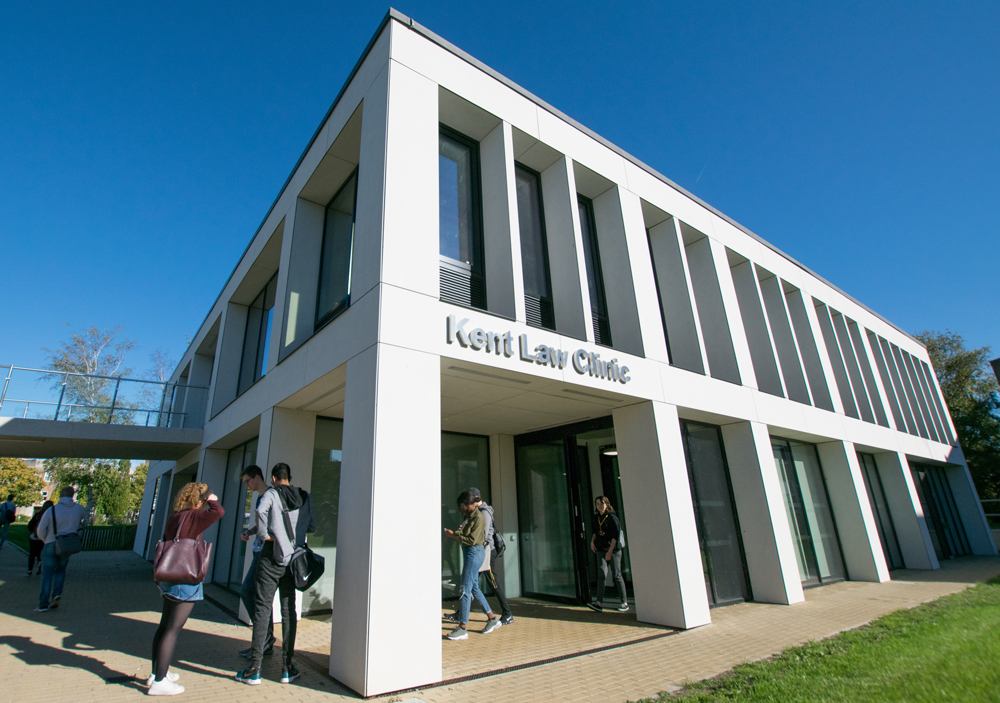Kent Law Clinic has been shortlisted in the LawWorks 2018 Annual Pro Bono Awards for its ‘Outstanding Contribution to Access to Justice’ over the last ten years.
This award, one of a number recognising achievement in legal pro bono work, has been set up in celebration of the tenth anniversary of the Access to Justice Foundation.
Kent Law Clinic is shortlisted together with: Eddie Coppinger (University House Legal Advice Centre); Steve Conforth (Steve Conforth Consultancy); Giles Peaker (Anthony Gold); Carol Storer (Legal Aid Practitioners Group); and David Warner (South Westminster Legal Advice Centre).
Director of Kent Law Clinic Graham Tegg said: ‘We’re very proud to be shortlisted in such a prestigious category – one that reflects a sustained commitment to providing access to justice over the last ten years. We’re enormously grateful to have the ongoing support of the University of Kent and Kent Law School. They have been pioneering and sustained in their support of the Law Clinic as a means of delivering access to justice and enhancing student education. This has been vividly expressed most recently when the University matched charitable funds to provide a new (£5m) home for the Clinic.’
Writing in support of the nomination, Solicitor Nick Fairweather, external Chair of Kent Law Clinic’s Management Committee said: ‘The Clinic is an extraordinary community of academic (practising) lawyers, students and volunteer private practitioners coming together with a profound public service ethos and a no-nonsense focus on making a real difference however modest that might be. Providing sustained access to justice must include not only providing an individual service but also the training and preparation of new generations of lawyers who will do this work.’
Clinic clients Brian and Sue Costello were also keen to support the Law Clinic’s nomination after receiving help with securing benefits for their severely disabled daughter, Clare: ‘We cannot speak highly enough of the ways in which Mr. Tegg and his students are helping people like our daughter and at the same time giving his students a deep immersion in law studies and practice.’
Kent Law Clinic provides a legal advice and representation service to those who cannot afford to pay. At the same time, it enhances the education of students at Kent Law School through direct experience of legal practice. The Clinic aims to provide a service that improves the quality of life of its clients – defending their security of tenure in their homes and ensuring repairs are carried out; insisting that claimants receive the benefits to which they are entitled; improving the situation for families in dispute or breakdown; obtaining compensation or re-engagement for dismissed employees and keeping others in employment (on at least the minimum wage); advising those who are in prison and assisting those in trouble with the law; re-uniting families of migrants settling in this country and obtaining asylum for those fleeing persecution; winning ‘town and village green’ status and public rights of way for local communities.
Each year the Clinic provides significant legal advice in response to hundreds of enquiries and takes on the formal representation of around 130 new cases. Since 1992, the Clinic has dealt with over 20,700 legal enquiries and has helped clients gain sums of money totalling £5,664,576.00 (this includes £2,510,687.00 in employment cases, £1,245,498.00 in benefits cases and £1,908,391.00 in other cases).
Integral to this provision is the support of local solicitors and barristers who advise clients pro bono at Monday evening outreach sessions in local community centres. These sessions are run by Kent law students who observe and assist the volunteer lawyers and report back to a weekly Clinic Meeting the following day.
Law Clinic solicitors also help teach and inspire the next generation of lawyers – each year around 60 law students are assessed for academic credit. Students assume joint conduct of live cases and, under supervision, interview clients, carry out legal research and draft correspondence, submissions and statements of case.
A further 200 students volunteer their services as receptionists, advice session organisers, in teams on criminal justice or immigration/asylum matters. They can also get involved in the work of the Clinic by participating in projects (such as the Kent Makeni Project).
Graham Tegg said: ‘Access to justice is about many things. Of course it is about assisting individuals and groups. Students derive great satisfaction from helping local people vindicate their rights and entitlements. It is also about thinking, reflecting, learning from what we do and thereby finding new ways to further the cause of justice. That’s what I like to think the Clinic does and will continue to do.’
Winners of the LawWorks awards will be announced at the Annual Pro Bono Awards event in London on Monday 3 December. The full list of awards and shortlisted nominees is available to view on the LawWorks website.

